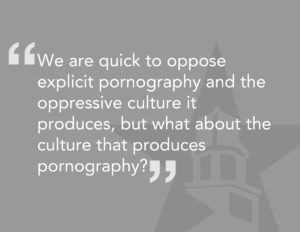Recently, the hashtag #NoPornNovember has been gaining an incredible amount of traction. Since the issue of sexual assault has been featured heavily in the media recently, this is no surprise. Allegations have been raised against famous porn stars Ron Jeremy and James Dean, as well as against Harvey Weinstein, bringing the dangers of objectification to the forefront of our minds. #NoPornNovember and adjoining campaigns seek to raise awareness about the negative effects of porn and encourage those recovering from addiction to speak up by saturating social media with posts, videos, and photos that share personal stories.
 Most people on Houghton’s campus would join a campaign like this (if they have not already) and would agree that sexual assault, sexually abusive “entertainment,” and objectification are innately wrong. The majority of students would genuinely consider all the aforementioned topics sinful and degrading, since these ways of engaging with others fail to see others through the perspective of Christ’s love. Personally, I am an advocate for the Fight the New Drug movement and am in full support of raising awareness to aid in the fight against and recovery from pornographic materials.
Most people on Houghton’s campus would join a campaign like this (if they have not already) and would agree that sexual assault, sexually abusive “entertainment,” and objectification are innately wrong. The majority of students would genuinely consider all the aforementioned topics sinful and degrading, since these ways of engaging with others fail to see others through the perspective of Christ’s love. Personally, I am an advocate for the Fight the New Drug movement and am in full support of raising awareness to aid in the fight against and recovery from pornographic materials.
However, I do not think that using a hashtag, having conversations about abuse and human trafficking, or even abstaining from porn altogether fully combat the issues. There is something deeper: a more subtle, pervasive threat that we have missed.
We are quick to oppose explicit pornography and the oppressive culture it produces, but what about the culture that produces pornography? We might not watch a sexually explicit film, but how many times do we laugh during an episode of New Girl or The Office that normalizes pornography and unhealthy relationships? We support women’s rights and chastise those who define women as sexual objects, but do so with the catchy beat of Swalla by Jason Derulo blasting in the background. The subconscious messages in a classic PG-13 movie showing women giggling when a coworker makes unwanted advances and those in an adult film normalizing abuse are not as different as we would like to think. Yet, when the content is branded as a romantic comedy, a satire, or a sexual joke at the lunch table casually brushed off, it is okay. It is funny. It was not meant to hurt anyone. A line is drawn between objectifying male genitalia for a couple laughs with friends and objectifying sexual partnerships between men and women in a pornographic film.
But friends, I do not care where it is from: objectification is objectification. Many of us who would happily advocate against the proliferation of pornography have absentmindedly ignored forms of media that are not explicitly defined as inappropriate. So long as it does not look like pornography, it is not perceived as objectification. We may think if it was not intended to hurt, then it does not deserve our attention, but in our averted gaze we have missed the larger narrative. As Christians it is our responsibility to pay attention, to look deeply into the chasm of our entertainment, and to honestly ask ourselves if we are doing all we can to dismantle the distorted sexual identity our culture has adopted. And right now, when I answer that question, it is with a solemn “no.”
 This does not mean that watching casual entertainment and consuming pornography are the same act, but that the underlying messages are eerily similar. If we want to fight one, we must fight the other. In both instances, a mask — humour, sexual expression, ignorance — veils a grotesque picture of humanity. When we look at our identities through the lens of modern entertainment we do not see masterpieces. We do not see human beings. We see objects used as the brunt of a ten second joke or the momentary pleasure given to a person who has been depicted as an animal with uncontrollable desires. And when we cannot see ourselves clearly in the house of mirrors, everything else around us becomes hopelessly disfigured. Cruder jokes are permissible, standards for respect are lowered, and the formerly clear lines become blurred.
This does not mean that watching casual entertainment and consuming pornography are the same act, but that the underlying messages are eerily similar. If we want to fight one, we must fight the other. In both instances, a mask — humour, sexual expression, ignorance — veils a grotesque picture of humanity. When we look at our identities through the lens of modern entertainment we do not see masterpieces. We do not see human beings. We see objects used as the brunt of a ten second joke or the momentary pleasure given to a person who has been depicted as an animal with uncontrollable desires. And when we cannot see ourselves clearly in the house of mirrors, everything else around us becomes hopelessly disfigured. Cruder jokes are permissible, standards for respect are lowered, and the formerly clear lines become blurred.
So, as many of us rally to anti-pornography movements against explicit objectification, let us take a closer look at the implicit messages we consume, adopt, and share. We should listen to our pulses beating instead of to lyrics about how tight her jeans are, and feel the embrace of hug instead of the emptiness left after viewing porn for the hundredth time. We should laugh when he makes you smile instead of when she cracks a dirty joke. Restore the complexity and humanity of yourself and those around you. And please, do not avert your gaze from just the explicit.
Emily is a Senior majoring in communication with a concentration in media arts and visual communication.
